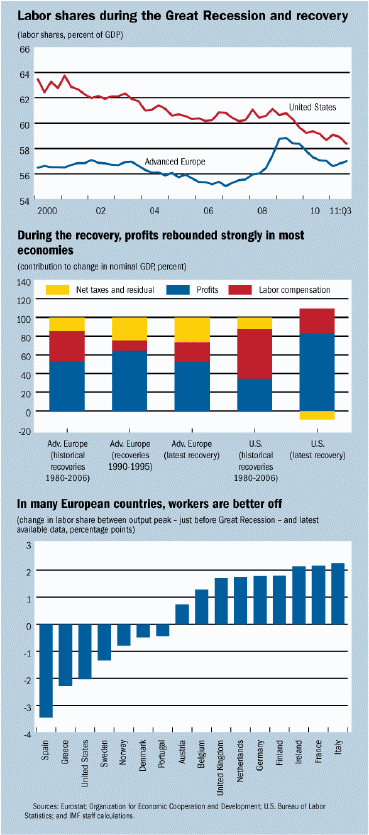
Typical street scene in Santa Ana, El Salvador. (Photo: iStock)
IMF Survey: Is Labor Compensation Still Falling in Advanced Economies?
May 24, 2012
- In many advanced countries, the labor share has been declining since the 1980s
- Labor compensation is still higher today than just before the Great Recession
- But the labor share has declined further in the United States, Greece, and Spain
A new IMF study finds that the share of national income received by labor has evolved quite differently across advanced economies since the start of the Great Recession, with the greatest losses observed in the United States, Greece, and Spain.

Construction worker in Washington, DC, United States, where labor compensation has been falling (photo: Kevin Dietsch/Newscom)
World Economic Outlook
Changes in the labor share—the share of workers’ compensation in GDP—are a commonly used measure of inequality.
But the link between the labor share and inequality is not necessarily tight. While more income may be flowing to capital and less to labor, workers may own shares directly or via their pension funds. Thus, some of the income that goes to capital flows back to them, diminishing the impact of falling labor shares on inequality. Still, the labor share is a good indicator of trends in inequality.
Labor share fluctuations
The IMF study looks at the cyclical behavior of the labor share in advanced economies, especially during the Great Recession and the subsequent recovery. Labor share data point to countercyclical behavior—that is, rising labor shares during the Great Recession and falling shares during the recovery (see chart, top panel).
During the recession, profits were the component that contributed most often to the decline in income, which caused the labor share to increase. During the recovery, although all components of GDP increased, profits rebounded quite strongly in most economies, leading to a decline in the labor share.
Labor share behavior
In advanced Europe, the behavior of the labor share during the most recent recovery seems broadly similar to what took place during other recoveries between 1980 and 2006: profits increased quite strongly relative to labor income (see chart, middle panel).
In contrast, the recent recovery in the United States appears unusual from a historical perspective and more similar to an average European recovery, with a much stronger rebound in profits relative to labor income. One explanation is that workers’ fear of long-term unemployment has led to more subdued wages relative to labor productivity growth during the recent recovery. But further research is required to determine the actual causes.
Workers: better or worse off?
In many European economies, workers are not worse off after the Great Recession in terms of their share of national income. The labor share is still higher today than just before the Great Recession in many economies (see chart, bottom panel). Yet, in the United States and in a few European economies (especially Greece and Spain), the labor share remains well below its precrisis level.
Only time will tell the extent to which the latest labor share losses in these countries will add to the general trend decline.



